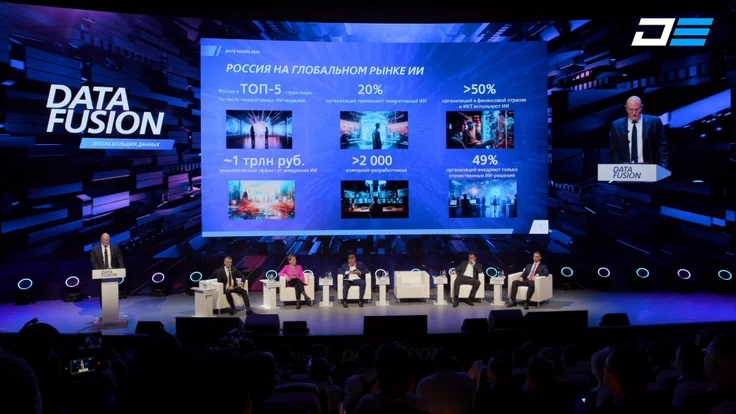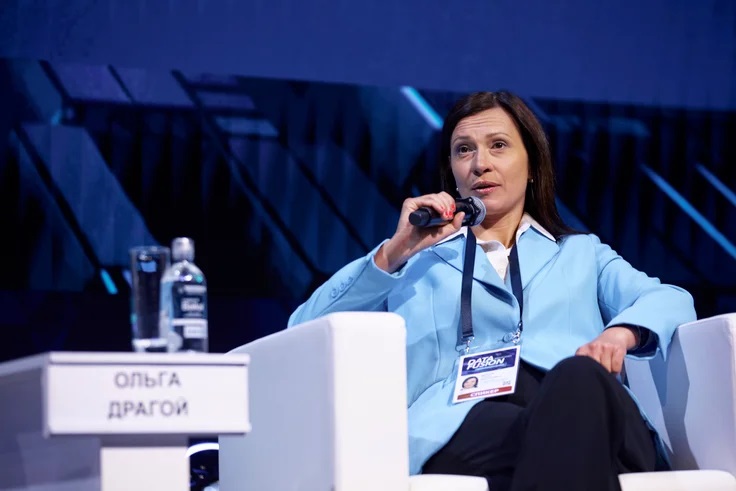‘You Need to Know a Lot of Ideas and Algorithms, Come Up with Something Unconventional’

A student of the HSE Faculty of Computer Science, Andrey Kuznetsov, has become the winner of the 2024 Data Fusion Contest. He took first place in solving geoanalytics tasks, and also won the special ‘Companion’ category. The competition took place as part of the 2024 Data Fusion conference on big data and AI technologies. Researchers from HSE University presented the results of their work and demonstrated applied developments at the conference.
The 2024 Data Fusion Contest took place as part of the conference, with more than 1550 participants from 33 countries registered, including Russia, Armenia, the UK, Kazakhstan, the Netherlands, and the USA (for a full list, please see the contest’s website in Russian). The tournament involved both advanced IT specialists and those just starting their professional journey.
First place in the ‘Geoanalytics’ category was taken by Andrey Kuznetsov, a second-year student of the ‘Applied Mathematics and Information Science’ Bachelor’s programme at the HSE Faculty of Computer Science. He also won the special ‘Companion’ category for the best open solutions to each of the tasks published by participants before the end of the competition.
Andrey Kuznetsov, second-year student of the Bachelor’s programme ‘Applied Mathematics and Information Science’
‘During the contest, as well as completing the task, you had to review materials on the topic, necessary literature, and existing approaches and methods. In the competition, there were two tasks—'Geoanalytics' and 'Churn Models.' In the first one, information about clients' card transactions was given, and you needed to predict the probability of cash withdrawal at a particular ATM. In the second one, using bank data for six months, you needed to forecast the probability of a decrease in user activity over the next six months.
Machine learning contests usually take a long time. We were given almost two months to complete the tasks. To achieve good results, it is necessary to analyse solutions from past competitions, as well as spending a lot of time on training, practice, and studying new material. You need to know a lot of ideas and algorithms in order to come up with something unconventional.
Compared to previous years and other competitions in general, this time the tasks felt more challenging. The competition took place on a convenient and stable platform, with many experienced specialists participating. That is why the joy of victory is even stronger!’
Scientists from HSE University participated in Data Fusion 2024. Alexey Naumov, Academic Supervisor of the HSE AI Research Centre, presented cutting-edge research directions and some achievements of HSE scientists at the session 'Overview of Key AI Research in Russia.' 'One of our recent achievements was an article that made it into the top 5% at the international conference AISTATS 2024. We demonstrated that training Generative Flow Networks (GFlowNets) is equivalent to a certain regularised reinforcement learning task. This discovery allows the direct application of a large number of existing reinforcement learning techniques and algorithms to improve the performance of generative flow networks,' he explained.
This year, the AI Research Centre has already had 8 publications accepted at top conferences such as ICML, NeurIPS, ICLR, AISTATS, and others. Researchers are also working on diffusion models, which enable the generation of complex protein and molecule structures, as well as data lying on bounded manifolds.
The AI Research Centre also presented applied developments for industrial partners. For example, a specialised NLP model, developed for Sber, generates readable descriptions of reasons for customer inquiries in order to improve the interpretability of themes obtained from clustering the flow of customer inquiries. This solution allows the bank to speed up the processing of over 300,000 customer inquiries per day.
Other representatives of HSE University also took part in Data Fusion 2024. Sergei Kuznetsov, Head of the School of Data Analysis and Artificial Intelligence at the HSE Faculty of Computer Science, moderated the case session 'Does Symbolic AI Have a Future, or Will Neural Networks Win Everything?' discussing the prospects of symbolic AI in light of tasks related to creating trusted artificial intelligence. During this session, Alexey Neznanov, Associate Professor at the HSE School of Data Analysis and Artificial Intelligence, delivered a presentation on 'Knowledge Management and Hybrid Intelligent Systems in the Corporate Environment, 20 Years Later.'
Sergei Kuznetsov also took part in the session 'Progress or Regression: Where is Artificial Intelligence Leading Us—Experts on Trends' and held a discussion with Sankar Kumar Pal, President of the Indian Statistical Institute, on 'India's Experience: Development of AI Technologies and DS-Science.'

Olga Dragoy, Director of the HSE Centre for Language and Brain, participated in the plenary discussion 'The Intelligence of Large Generative Models—Is the Birth of Thought from Language Possible?', where experts discussed the possibility of extracting intelligence from speech, searching for a basis for AI development, and forming an environment in which AI will evolve.
HSE scientists also presented the results of their research at a poster session:
Konstantin Vishnevsky, Director of the Centre for Strategic Analysis and Big Data at the HSE Institute for Statistical Studies and Economics of Knowledge (ISSEK), and Maria Svarchevskaya, a leading expert at ISSEK, gave a presentation on 'The iFORA System for Intelligent Big Data Analysis.'
Alexander Kirdeev, Research Assistant at the International Laboratory of Bioinformatics of the HSE AI and Digital Science Institute, presented on 'Predictive Models in Personalised Medicine.'
Maria Sakirkina, Chief Analyst of the HSE Faculty of Geography and Geoinformation Technology, presented on 'Geoanalytics and Geodata: Evaluation of Natural Climatic Risks.'
The Data Fusion 2024 conference took place in Moscow on April 17th–18th. The event was attended by the Prime Minister of Russia Mikhail Mishustin, Deputy Prime Minister Dmitry Chernyshenko, First Deputy Governor of the Bank of Russia Olga Skorobogatova, President and Chairman of the Board of VTB Bank Andrey Kostin, President of Rostelecom Mikhail Oseyevsky, CEO of VK Vladimir Kiriyenko, and other businessmen and public officials, leading scientists, and experts in big data analysis and AI technologies.
See also:
Registration for Russian Olympiad in Artificial Intelligence 2025 Now Open
Registration for the fifth season of the Russian Olympiad in Artificial Intelligence has opened. This year, the competition has gained international status. The event is open to students in the 8–11 grades both in Russia and abroad. The winners will receive benefits when applying to Russian universities.
Global AI Trends Discussed at International Foresight Workshop at HSE University
At an international foresight workshop on artificial intelligence held at HSE University, Russian and foreign scholars discussed the trends and challenges arising from the rapid development of AI.
HSE Students Win International Olympiad in Artificial Intelligence
In the finals of the olympiad, the Russian team competed with 300 talented schoolchildren from 61 countries, including Australia, Brazil, Hungary, China, Mexico, the United Arab Emirates, Poland, Serbia, Singapore, the USA, Sweden, and Japan. The finals included team and individual rounds. In the team round, the Russian team made it into the top 10, winning a silver medal. In the individual competition, Russian schoolchildren won six gold medals, one silver, and one bronze.
‘Neural Networks Can Provide Assessments As Accurate As Humans’
Voice assistants have become part of everyday life. They can plan routes, play music and films, and answer questions. But the quality of their speech requires assessment. To address this, students of the Applied Artificial Intelligence Workshop at the HSE University and VK Engineering and Mathematics Schoolhave developed neural networks capable of evaluating speech synthesis.
HSE to Entrust Routine CPD Programme Development to AI
HSE University, together with the EdTech company CDO Global, is launching AI-based constructors to streamline the design of continuing professional development (CPD) courses. The new service will automate the preparation of teaching materials and assessment tools, significantly reducing the time and resources required of lecturers and instructional designers.
HSE University Becomes Absolute Leader in AI Alliance Ranking of Universities
TheAI Alliance Russia has announced a new ranking of Russian universities based on the quality of education in the field of AI. A total of 203 universities from 68 Russian regions participated in the ranking. HSE University was the first to join the highest A++ group.
HSE University and MTS Join Forces to Combat Deepfakes and Train AI to Create Bespoke Video Content
HSE University and MTS Web Services (MWS) have announced the launch of a series of joint research initiatives in the field of artificial intelligence technologies. These efforts aim to develop innovative solutions in cybersecurity, multimodal content generation, and big data analysis. The project’s leading institution is the HSE Tikhonov Moscow Institute of Electronics and Mathematics (HSE MIEM), under the overall coordination of the HSE AI Research Centre.
HSE University Brings Together Researchers at International AI Summer Institute in Shanghai
In early July 2025, the International Summer Institute on Artificial Intelligence in Education took place in Shanghai. It was organised by the HSE Institute of Education in cooperation with East China Normal University (ECNU). More than 50 early-career researchers and keynote speakers from nine countries—ranging from Russia and China to Canada and Singapore—gathered to share the latest findings from their work and to forge new international partnerships.
‘Economic Growth Without the AI Factor Is No Longer Possible’
The International Summer Institute on AI in Education has opened in Shanghai. The event is organised by the HSE Institute of Education in partnership with East China Normal University (ECNU). More than 50 participants and key speakers from over ten countries across Asia, Europe, North and South America have gathered to discuss the use of AI technologies in education and beyond.
Recommender Systems: New Algorithms and Current Practices
The AI and Digital Science Institute at the HSE Faculty of Computer Science hosted a conference focused on cutting-edge recommender system technologies. In an atmosphere of active knowledge sharing among leading industry experts, participants were introduced to the latest advancements and practical solutions in recommender model development.


